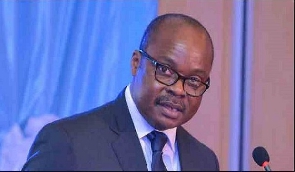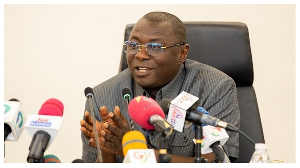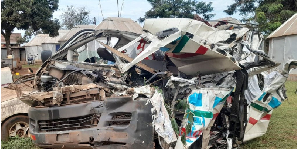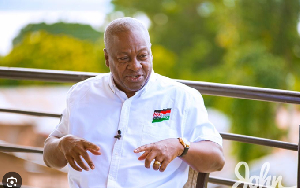The Bank of Ghana says it has completed its clean-up exercise of the banking and specialized deposit-taking (SDI), and non-banking financial institutions (NBFI) sectors.
This was contained in a detailed statement issued by the central bank announcing the revocation of licences of 23 savings and loans company today {Thursday].
The statement from the BoG said ”the Bank of Ghana has with effect from today, completed the clean-up of the banking, specialized deposit-taking (SDI), and non-bank financial institutions (NBFI) sectors which began in August 2017.”
According to the BoG, it has revoked the licences of 9 universal banks, 347 microfinance companies, 39 microcredit companies, 15 savings and loans companies, eight finance house companies, and two non-bank institutions.
The statement said: ”This follows the revocation of the licences of nine (9) universal banks, 347 microfinance companies (of which 155 had already ceased operations), 39 micro credit companies/money lenders (10 of which had already ceased operations), 15 savings and loans companies, eight (8) finance house companies, and two (2) non-bank financial institutions that had already ceased operations.”
The bank has assured the public it will continue to maintain discipline in the sector saying: ”The Bank of Ghana is committed to ensuring that the banking, SDI, and NBFI sectors remain resilient, inclusive, and supportive of Ghana’s economic growth trajectory. To ensure that the remaining institutions remain resilient going forward, the Bank of Ghana will remain vigilant, intensify on-site examinations and enforcement actions including the application of sanctions for non-compliance with statutory, prudential and other requirements, and ensure that early warning signs of distress are mitigated by regulated institutions expeditiously. The Bank of Ghana will also work with ARB Apex Bank to reposition the rural and community banking sector, to enable them to better support rural economic development.
Furthermore, the Bank of Ghana and the Government of Ghana will also launch the commencement of operations of the Ghana Deposit Protection Scheme in September 2019 to further strengthen protection of depositors’ interests. ”
Finance Minister’s Statement on Banking Crisis during Mid-year Budget Review
The Minister during the presentation said as a result of the bold and decisive measures taken to fix the banking crisis, “our banks are stronger and richer, and, with the cost of borrowing dropping, banks can and should, therefore, do a lot more to support the growth and expansion of business which will create more jobs under the stable environment that has been provided by Government for that exercise.”
He continued that the government knew the foundation for growing businesses and creating jobs everywhere was a vibrant, well-governed, well-resourced, competitive financial services sector, operating under a stable economic regime, that was why it could not watch the sector collapsing, even if it meant slowing down for a year or so on some of its own scheduled programmes.
In the recovery process, he said “we managed to set up the Consolidated Bank Ghana Limited and capitalised it with GH¢450 million. Just this month, CBG has released funds, totalling GH¢530 million to Cocobod for cocoa roads. We provided funding of GH¢11.2 billion to secure depositors’ funds in the failed banks. The Ghana Amalgamated Trust has provided funds, to capitalize solvent indigenous banks that were struggling to meet the enhanced minimum paid-up capital of GH¢400 million. We have recently provided an additional GH¢925 million for pay-outs to small depositors of the 386 microfinance institutions.”
He said confidence had been restored into the banking system, securing the otherwise distressed deposits of some 2,655,100 customers, as well as saving over 3,000 jobs. “Today, total banks’ assets have shot up to GH¢112.8 billion. Growth of credit to the private sector is rebounding assuredly by 16.8% in June 2019. I am, therefore, happy to announce confidently that Ghana is seeing the revival of that zealous, responsive and, at the same time, responsible banking environment we had been reduced to reminiscing.”
Background
As part of its efforts to restore confidence in the banking and specialized deposit-taking sectors, the Bank of Ghana embarked on a clean-up exercise in August 2017 to resolve insolvent financial institutions whose continued existence posed risks to the interest of depositors.
A comprehensive assessment of the savings and loans and finance house sub-sectors carried out by the Bank of Ghana in the last few years, identified serious challenges (see Annex 2), summarized as follows:
The levels of capital held by some savings and loans companies and finance house companies were in violation of the minimum regulatory capital required by Act 930. This made it precarious for these institutions to continue to undertake the business of specialised deposit-taking institutions, given the risks they posed to their depositors and other counterparties to whom they were exposed directly or indirectly;
Excessive risk-taking without the required risk management function to manage risk exposures;
The use of depositors’ funds to finance personal or related-party projects or businesses on terms that were not commercial, leading to little or no income accruing to the relevant savings and loans companies or finance house companies and thereby compounding their liquidity challenges;
Corporate governance weaknesses with weak Board oversight, poor accountability, and override of internal controls;
Creative accounting practices and under-provisioning for impaired assets, thereby misrepresenting their true financial condition to the Bank of Ghana and other stakeholders; and Persistent regulatory breaches, involving non-compliance with Bank of Ghana’s prudential rules, and failure to implement Bank of Ghana on-site examination recommendations.
All efforts by the Bank of Ghana to get the shareholders and directors of the affected institutions to rectify the above lapses, especially the significant capital deficiencies, yielded no positive results. Consequently, the financial position of these institutions has continued to deteriorate, leading to their insolvency with some of them ceasing operations and closing their offices to depositors whiles those currently in operation are unable to pay depositors and other creditors at all or fully.
Given the risks that these institutions continue to pose to the entire financial system and the need to protect the interest of depositors, the Bank of Ghana is sanitizing this subsector through the orderly resolution of the failed institutions in accordance with Sections 123 to 137 of Act 930.
General News of Friday, 16 August 2019
Source: rainbowradioonline.com

















